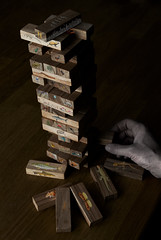April 23rd, 2014 § § permalink
Last month I wrote an article for the From Little Things blog called – Startups are sacrifice… for ALL involved.
Now I’ve been thinking long and hard about this. Why should entrepreneurs and the wider startup ecosystem care about startuppers and the points I raise in that piece? And how do we make them care?
There’s been a lot of talk about what the Australian startup ecosystem needs in order to grow and establish itself as a key player alongside other startup hubs like Silicon Valley and Israel. These discussions tend to focus on venture capital, government support and the ‘brain drain’ which happens with local startups having to leave our shores to secure vc funding.

What is missing from this debate is the local brain drain happening right under our noses. Aussie-based startuppers work in a startup or two and leave the ecosystem for corporate jobs, taking a wealth of learnings and experience with them. Anecdotally, just by looking at my LinkedIn contacts, I estimate that up to 90% of all startuppers I have worked with on about 10 startups have left the Aussie startup ecosystem. Of that 90%, about 10% are in startups overseas, 5% are now freelancers, and the rest are now in local corporate jobs. Very rough numbers and a tiny sample, but those numbers should worry anyone currently contributing to building our startup ecosystem.
There are serious implications of this local talent drain. A high churn rate is an obvious talent loss. There is also a time and monetary loss when we take into account what is then spent on bringing in new talent and training them up. It means that we have a really small pool of mature startuppers who could support an entrepreneur new to the industry. With a knowledge haemorrhage as severe as this, we will never get to a sustainable startup ecosystem. Not when every new startup is literally starting from scratch on all fronts. We absolutely need to keep knowledge transfer going, from entrepreneur to entrepreneur, entrepreneur to startupper, startupper to startupper and startupper to entrepreneur. We’ve done well with the first two flows with things like the Silicon Beach mailing list and the explosion of networking events over the last 4 to 5 years. The latter two flows however need a lot of work.
I admit it was heartening to see the Crossroads Report list increasing the numbers of people with ICT skills and improve access to startup expertise as two of their 7 key actions, but I think it would be akin to bailing water from a leaky boat using a colander if talent retention isn’t addressed. If we want to build a sustainable Aussie startup ecosystem, we HAVE to build a startup talent ecosystem inside it. And when someone like me, who used to proudly declare ‘I’m a startupper for life!’ has been interviewing for corporate jobs 7 years into a startup career, Australia, we have a problem.
September 24th, 2013 § § permalink
I was invited to be a beta tester recently, and it struck me that I haven’t been seeing calls for beta testers being put out any more.

It might be that the beta testing period has been subsumed by Lean methodologies. After all, beta testing is about the feedback loop which is implicit in the lean process.
It might be that beta testing is just that much harder on mobile than web, and it was just left behind because it didn’t fit with the ecosystem any more.
But then the feedback loop isn’t visible to me these days. At least in the young startups I’ve been following. From the outside the process most startups seem to follow is: announce idea on Launchrock -> launch MVP -> growth hacking (simplified obviously). As a user of these services I am not asked for feedback, and I don’t usually see any obvious feedback collection mechanisms on the app. Is everyone relying on metrics these days?
Did beta testing lose its value because early beta testers are a very niche segment of the market, or not even a customer segment at all?
When I worked at Tangler.com, we had a dedicated beta testing forum where startups would put out the call and beta testers would jump in, test the products and let loose with their feedback. It wasn’t always easy for the startups to handle it – we had a bunch of very early adopters who had technical backgrounds so they tended to have really high expectations and …. let’s call it brutally honest feedback.
In addition, there’d always be the inevitable drop off in usage. Beta testers would flock to the new shiny, test it and move on. From a startup’s perspective this was a roller coaster ride. They’d get a spike in sign ups and activity, and then have to deal with the lull. Well that was a bummer….
There was one shining example of a success story however. A bunch of us were invited to test out Weewar.com, an asynchronous, multi-player strategy game, and in the process of testing the game, we were all hooked. A bunch of us brought our non-tester friends in – just so we could keep playing while waiting turns on other games! The founders of Weewar were very active in responding to feedback and this was also evident in the product’s evolution. Weewar was eventually acquired by EA Games.
What I think is a big loss with not actively running in a beta testing phase is the feedback loop between startups and users. (I’m not using the term ‘customers’ on purpose.)
There is an implicit social contract at play – as users we will use your product and provide feedback, as startups we will listen and consider the feedback. There is a lot more to this than obvious at first glance. As a user I am more inclined to provide feedback if I know there is a purpose for it. That it will be considered by someone. As a startup it affects how I run my communications strategy, whether or not I include a feedback mechanism into my product, how I manage my backlog.
Beta testing is a state of mind for all involved.
So startups, look at yourselves, evaluate whether running a beta testing phase is a fit, and then do it. You will get invaluable insights into your product’s UX, features and potentially even its future.
And beta testers, instead of throwing out a whinge on Twitter (GUILTY!) hit up the startup’s contact page and make a valuable contribution.
Oh, and the startup that kicked this post off – Formula Legend. Make sure to check em out and sign up if it’s your thing.
January 6th, 2012 § § permalink

It occurred to me today why I like flickr and Instagram and Retrocamera and all those other photosharing apps.
It’s a stop-and-smell-the-flowers moment captured and best of all, paid forward. That moment the photographer stopped to experience, capture and share – it rubs off on everyone else who stops to look at the image down the line.
Like that Stop sign I snapped. I could’ve gone merrily on my way, but I didn’t. After giggling at it myself, foremost on my mind were all those I knew would get a chuckle out of it, and so there it is, sitting in my Flickr stream having been shared on Twitter and Facebook.
I’ve read opposition opinions to filters, mobile photography and photographers (narcissistic, fiddling with a device instead of being in the moment etc) but I think the real value of these apps is that they’ve heightened people’s awareness to the little things around them. I would actually counter that we are all taking micro-moments out of the journeys we’re on and observing and appreciating the beauty and humour around us more than before as a collective.
If this were a side effect of a business I was working on, I’d be mighty proud.
September 22nd, 2011 § § permalink
So as y’all probably already know, I started at Pollenizer some weeks ago. This meant transitioning to a Mac as my work computer.
I get the machine, take a deep breath, and scroll down. I mean up. I mean… I don’t even know anymore.

I ranted about it on Twitter, and my helpful Twitter peeps helped me find the settings for it and turn it off. *phew*
But I couldn’t get it out of my head. Why? Why would Apple add that as a feature?
I get that it’s the same action we’re all used to performing on our smart phones. You move your digits in the direction you want stuff on the screen to move in. And it’s intuitive, and perhaps understandable to take that and say, well, why do we use the opposite behaviour on our laptops? All interfaces should be the same! Eureka!
I’ll tell you why not. Context baybeh.
The smart phone is analogous to reading a newspaper lying flat on your breakfast table. As you scan down the paper, you move it up with your hands. So you’re scrolling up to move the media up.
Now, visualise this – Child dek scanning down a list of names engraved on a wall so she can find her grandfather’s name (which the temple put there cos he donated some dough to its building fund). I was a kid and there were many many names cramped in, so I used to put my finger on the wall and move down the list of names.
Something like this image below:

On this media, you scroll down to ‘move the media up’. And I think that is the context of scrolling on a laptop. Your laptop screen is a wall in this context.
And I think that is why I struggled so badly with trying to work with the new scroll system on the Mac. It was hard to change a learnt behaviour not just because I’m an old dog, but because the context didn’t suit it.
August 11th, 2010 § § permalink
I was at the Gallery of Modern Art in Brisbane a couple of months ago with the primary aim of seeing Ron Mueck’s works on display. Before we hit the Mueck exhibition, we walked around the main gallery, where there were an assortment of works on display, from old furniture to paintings from all genres. As I went through I couldn’t help but feel dissatisfied, and I sent this out:

My beef isn’t just with galleries. I dislike museums, zoos, exhibitions – anything where one is expected to just walk through a space and observe an artefact. Look and move on.
I want to experience these objects. Personally, the sense I struggle to control the most is touch. I practically have to restrain my hands in order to curb the urge to feel the texture of a carved wooden chair, or the feel of an oil painting. (Don’t tell anyone, but some times I touch the edges of a painting’s frame just to somehow connect with a work)
I’ve been thinking about this for a while now. I’m well aware of the preservation issues facing curators. But as I thought about it, I realised that we can extend the ‘observe’ model to traditional media – print, broadcast, film. All of a sudden the ~insert country of choice~ Idol phenomenon made complete sense. It allowed the audience to break the ‘sit and observe’ model and actively participate in the program. The more one votes, the more one feels they have a say in the outcome of a series. That the creators of the show recognised and monetised that is just genius. (I will now reduce my scorn towards reality shows like Idol)
This is where social media’s real ace is. It allows us to experience events, instead of just being observers. Q&A is a great example of that. The panel and the things they say usually annoy me, yet I watch it because there is very engaging discussion around it on Twitter. The same thing happened with other tv shows, like Iron Chef, sports events, and even events unfolding (I will NEVER forget the day we waited for Pres Obama to be declared the winner. Nor the day the Mumbai attacks were in progress.)
This is what I’m now gonna say to people who question my use of social media, or who tell me they don’t get it – I ceased to be an observer through social media. Involvement leads to engagement and all of it lends to an experience. It is what I’m gonna say to businesses that ask me why they should bother with social media. The Old Spice campaign was a great example of engagement on a large scale, but I do believe every business can apply the ‘experience’ model on a small, everyday scale.
So, back to the spaces I started off this discussion with. Dear museums, zoos, galleries, ya know how you have programs for kids where they get to be hands on and have fun? I want that. For adults aren’t all that different from kids. Have a Picasso on display? Have a spot where I can have a go at painting in his style. I would treasure that experience, link the memory to your display, and certainly return for more.
June 8th, 2010 § § permalink
So Quit Facebook Day has come and gone. From what I can tell, two of my friends, Mark Pesce and Nathanael Boehm deleted their profile. (It’s hard to be sure just how many deleted their profiles, from what I can tell my total friends’ count has gone up *scratching head*). That’s cool, I have them on Twitter anyways.
I have read theirs and others’ reason for quitting, and on an idealistic level, they have a point. I’m pissed at Facebook, I feel like they’ve reneged on the deal we had, I don’t trust them AT ALL, and I would like out too.
Reality however, as so often is the case, is a bummer. The fact of the matter is that I am too embedded in that closed off, archive-free (a pet peeve, indulge me) ecosystem. It’s not about content. A while ago I made a conscious effort to put my content elsewhere and port it all into Facebook. I basically stopped trusting Facebook with my stuff a while ago.
But here’s what Facebook has that I can’t give up – I *won’t* give up – my people. I’ve spent immeasurable time and effort building my circle and there are people there I don’t have access to outside Facebook. It’s not that we won’t be able to keep in touch outside it, but the fact is that our relationship exists *wholly* within it. We would never email each other – exchanging comments on status updates and wall posts is the extent of our relationship. I would warn against trivialising these relationships due to the nature of the communication. These friends of mine diversify and add colour to my horizon. They’re like the neighbours you see in the street – you exchange pleasantries, clear out each other’s mailboxes when the other’s away – close enough to care, far enough to not share your secret recipes with.
Another form of communication that doesn’t exist outside Facebook is third-party-enabled exchanges. This is the stuff you see that friends of a friend have put up about them. Stuff that you wouldn’t see otherwise. And before you yell ‘STALKER’ at me and run off, I’ve got a real world example for ya.
I’m in California, my parents are in Singapore, and my brother takes off for an European tour with his trash metal band. I had no way of reaching my brother, so my only irl source of keeping in touch with him was through my mother. There was one night when I had a call with my mother who was updating me where bro was and how he was, while at the same time looking at pictures of his trip that his band mate had uploaded to Facebook and tagged him in. I in turn was able to update my mother that it looked like he was still in one piece and having fun. 😛

And then the kicker – I take an image my brother’s friend (who I’m not connected to) has uploaded and share it on my wall, thus allowing all my people who aren’t friends with him to see what he is up to. The comment in that wall post is by a friend of mine currently in India. That’s a four-party-exchange of information that would not have happened this easily any where else.
So give me any argument you have against Facebook, any other platform you can build to replace it – as long as it doesn’t replicate the immediate, intimate and enabled methods of communication Facebook currently provides, I can’t leave. I’m staying, and while I’m there, what I can do is make efforts to educate my people on best Facebook practices, and aid organisations like DataPortability.org to make big bad Facebook a more trustworthy place to hang out. For what it’s worth, I have hope that we’ll all live happily ever after.





